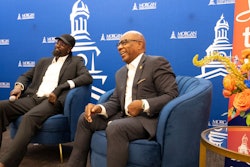For several years, the Dartmouth Global Health Initiative, a unit within Dartmouth University’s medical school that promotes global health research, has had a close working relationship with Muhimbili University of Health and Allied Sciences in Dar es Salaam, Tanzania. Among other things, both universities work together to provide treatment options for children who are HIV positive. Each year, several Dartmouth medical students travel to Tanzania to do field work. And many students from Muhimbili have come to Dartmouth to pursue graduate degrees in public health. Both universities also have worked closely on the development of a vaccine that reduces the chances of HIV infection.
Indiana University and the University of Massachusetts Medical School recently teamed up to address the shortage of health care workers in the impoverished West African nation of Liberia, which is still reeling from the aftermath of two civil wars that lasted 11 years and killed tens of thousands of people. The two universities are collaborating with the University of Liberia to produce badly needed graduates in fields such as nursing, biotechnology, public health and medicine.
Faculty members at the University of Texas at Arlington are working with Fourah Bay University in Sierra Leone, another West African country that was turned upside down by a lengthy civil war, to develop that nation’s first degree-grant social work program.
From student and faculty exchanges to joint research projects, U.S. universities maintain a broad spectrum of collaborative relationships with African universities.
It’s unclear how many U.S. colleges and universities have partnerships with African universities. The African Studies Association, an organization of scholars, doesn’t keep that kind of data. But anecdotal evidence suggests that more colleges and universities are reaching out to counterparts in Africa.
Some of the interest stems from a desire to force students out of their comfort zones, says Dr. Randolph Quaye, director of Ohio Wesleyan University’s Black World Studies program.
“[The] majority of Americans prefer to study in Europe,” says Quaye, whose Delaware, Ohio-based college sends a group of students and a professor to the University of Dar es Salaam in Tanzania for a semester where they take classes, stay in the homes of Tanzanians, travel extensively throughout the country and immerse themselves in the culture. “Africa is lagging behind. More universities are trying to expand their offerings.”
Dr. Alusine Jalloh, an associate professor of history and founding director of the Africa Program at the University of Texas at Arlington, adds: “UT-Arlington is part of a group of Texas universities competing for state funding to become a tier-one university. For us to become a major research university we need to have some presence in Africa. This is a whole continent.
“All the major universities in the U.S. that I know of have some collaboration with Africa from an academic point of view. Another reason is Africa is an emerging market in the global economy. I think it would be foolhardy for us to ignore a whole continent like Africa in our international outreach efforts.”
Pioneer Collaborators
Indeed, for several decades, extensive collaborative relationships with African universities have been the province of major research institutions. One of the earliest major collaborations was between Oklahoma State University and an institution of higher learning in Ethiopia that is known today as the Haramaya University, according to Dr. David Wiley, who served as director of the African Studies program at Michigan State University from 1978 to 2008 and who is widely considered one of the nation’s dean of scholars of African studies. Oklahoma State helped found Haramaya University in Ethiopia in 1954. Dozens of faculty and staff from Oklahoma State helped get the new school with its focus on agriculture off the ground.
In the late 1950s, at the dawn of independence from European colonialists, more relationships were forged. At the time, only a handful of universities existed in Africa. In some cases, many African governments needed technical assistance in building new universities or upgrading existing institutions of higher learning to university status.
The university perhaps most celebrated for its partnership with African institutions is Michigan State University, which, during the 2010-11 school year, marked the 50th anniversary of its presence in Africa. MSU kicked off its work in Africa in Nigeria by helping establish the University of Nigeria in the new nation’s eastern region. Nnamdi Azikiwe, who would go on to become Nigeria’s first president, approached MSU for assistance in building a university modeled after some land-grant schools in the United States. The relationship blossomed for years as dozens of faculty members trooped from East Lansing, Mich., to Nsukka, Nigeria. But a civil war in Nigeria in the late 1960s ended the relationship. In the meantime, MSU’s administration and faculty moved on, establishing partnerships throughout the continent.
Wiley says American universities have become increasingly sensitive about ensuring that the partnerships are an arrangement between equals. Some foreign academics, he says, have the impression that American universities tend to treat African counterparts as subordinates, rather than equals, in such partnerships. There have been many instances, he says, when the partnerships were not “equitable, reciprocal and transparent.”
There were instances, he says, in which U.S. institutions obtained grants by listing African schools as partners but treated them as subordinates or junior partners. In many instances, these African universities had no idea how much the U.S. government or one of its agencies was pumping into the partnership. The American partner not only kept the information close to its vest but got to control when and how the money was spent.
“That usually took the form of attaching a letter from an African institution,” he says. “But a lot of these letters were generated without the African institution seeing a full description of the budget and issues of salary, indirect costs and fringe benefits.”
In the 1990s, Michigan State University co-sponsored a conference on best practices for higher education partnerships between U.S. and South African universities. Wiley says those best practices have since been adopted by leading U.S. universities when dealing with counterparts throughout the continent. Some of these best practices include transparency on funding, transparency on issues of power, joint decision-making and adhering to the ethical guidelines of organizations such as the American Sociological Association and the American Anthropological Association when dealing with human subjects.
The nature of partnerships spans the spectrum. Jalloh of the University of Texas at Arlington thinks the establishment of the social work program in Sierra Leone can be a major force in eradicating many of the pathologies that have become commonplace in the aftermath of a war where child soldiers were commonly used.
“Sierra Leone is a post-conflict society,” Jalloh says. “This is a place where there are so many social needs. They’ve never had a full-fledged program to train social workers. There are many street children. The war led to the displacement of so many kids. They are all over the place. There’s also the question of women. How best to work with the war widows — women who lost their husbands and breadwinners. Then there’s the question of gender violence, domestic violence and prostitution.”
Jalloh says UT-Arlington is helping design the curriculum and setting up a departmental library. The university and its partners in Texas also have provided furniture and computers UT-Arlington also will seek grants to help fund the department.
Like UT-Arlington, Dartmouth is proud of its partnership with institutions of higher learning on the African continent, particularly Muhimbili University of Health and Allied Sciences in Tanzania.
Dr. Lisa Adams, an assistant professor at Dartmouth’s medical school and director of the school’s Global Health Initiative, cites a nine-year vaccine trial that reduced the possibility of getting tuberculosis and HIV infection by 36 percent as one of the hallmarks of the relationship.
“A byproduct of conducting the vaccine trial is training and expertise,” she says. “The training has a trickle-down effect. It leads to improved health services.”
But not all relationships go into this kind of depth. McDaniel College in Maryland recently began a relationship with Africa University in Zimbabwe. The relationship was brokered by a McDaniel trustee who is an active volunteer with the Methodist Church, which supports the university in Zimbabwe. In January 2011 two McDaniel faculty members and five students traveled to Zimbabwe for three weeks. They distributed about 2,000 mosquito nets and helped in the construction of two school buildings. McDaniel College had an exchange student in Zimbabwe in fall 2011 and plans to send more students and faculty members to Zimbabwe.
“The primary goal is to increase opportunities for students to expand their view of the world,” says Dr. Thomas Falkner, provost and dean of the faculty at McDaniel. “The hope is that each institution could become a resource for each other. We have several faculty whose focus of research is Africa.”
Equal Partners?
MSU’s Wiley, however, views some partnerships between American and African universities with some skepticism.
“Most of them don’t bring African students reciprocally,” he says. “Frankly, I wouldn’t classify them as partnerships. An African colleague said to me once, ‘American universities are farming out their students’ education on a cheap labor basis to African universities with poorly paid faculty members.’”
Universities that send their students to Africa for a semester, he says, often charge the students full tuition. They deduct the cost of the tuition at an African university, he says, which is often relatively nominal by American standards, and pocket the rest. Wiley thinks some universities involved in some of these exchange programs should consider giving half the profits to their African partners, many of which are struggling financially. But collaborating with universities in most African countries comes with many challenges, such as a lack of adequate facilities and corruption, in some instances.
Dr. Charles Reafsnyder, associate vice president for international research and development at Indiana University, says the University of Liberia still has no electricity or Internet connectivity.
“Last summer we talked to the physics chairman and asked what kind of equipment he had,” he says. “All he had was a rusty, old scale. Everything else was pen and paper.”
At McDaniel College, school officials are working with their counterparts in Zimbabwe to develop a joint online class that will be taught by professors from both colleges. Dr. Deborah Johnson-Ross, McDaniel’s associate dean of academic affairs, says constant electricity supply is a big issue in Zimbabwe. And at Africa University, she adds, “Bandwidth is a problem. But we’ve got some good technical people working with us.”
“Our Tanzanian colleagues get as frustrated as we do with brownouts, blackouts and vehicle problems,” says Dartmouth’s Adams. “Conference calls are often interrupted. Or when the Internet goes down and we can’t send a report.”
Combating Corruption
At many institutions of higher learning in Africa, faculty wages are paltry and sometimes go unpaid for months. This, in turn, fuels corruption.
Ken Harper, an assistant professor of journalism at Syracuse University, is part of a team of professors working to help the University of Liberia reboot its journalism program. On one trip, he says, a department head asked him to part with some of the laptops he’d taken with him as gifts for the school as a reward for cooperating. Harper declined.
To compensate for the lack of adequate resources, several African universities are slowly emulating the American model of fundraising as a survival strategy. Reafsnyder at Indiana University says the president of the University of Liberia has been aggressive about attacking corruption. He has removed corrupt administrators, tripled salaries of faculty members and held mandatory seminars on ethics for faculty and staff.
Organizers of these collaborative programs stress that the benefits transcend the challenges — for both sides. For the Africans, it provides an opportunity to develop relationships with well-heeled institutions and to broaden their access to badly needed resources. For the Americans, it is a chance to learn new skills and to expand their research.
“We often say to them we need you more than you need us,” says Wiley.
“I always stress that we are all about partnership and reciprocity,” says Adams. “We don’t see this as a one-way street. There’s a lot of mutual learning that goes on.”















